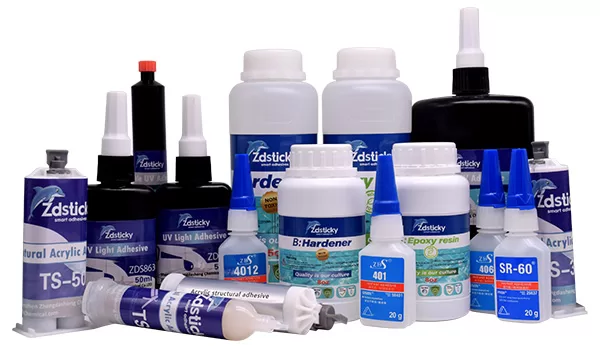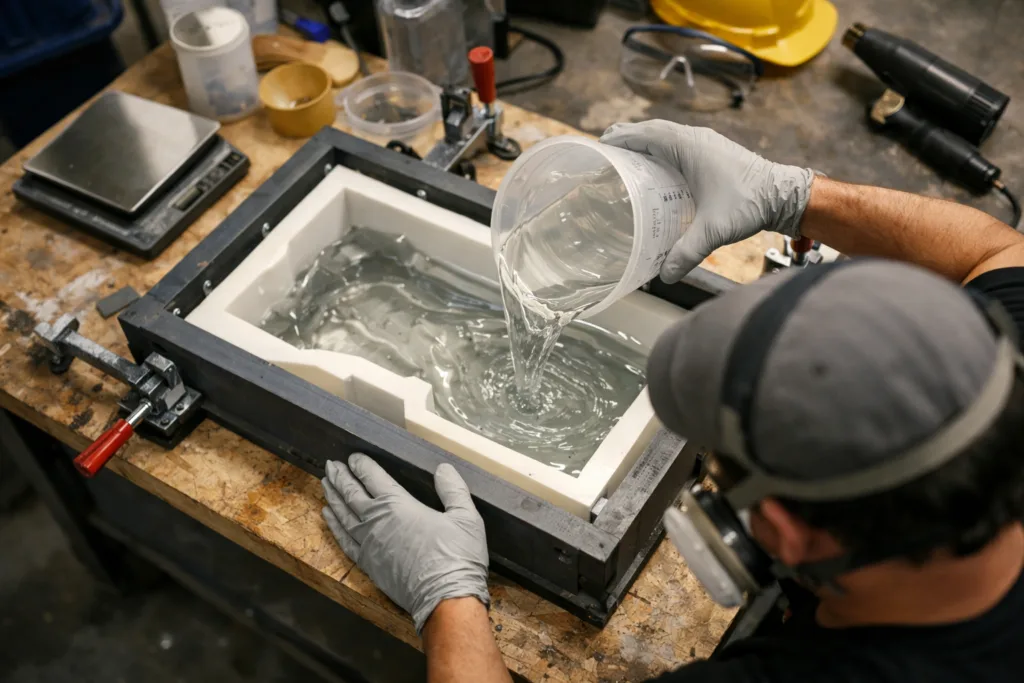Boat owners, shipbuilders, and marine engineers often face the same question: which adhesive is better for boats—marine epoxy or polyurethane? Both are widely used in boat construction and repair, but they differ in performance, application, and long-term reliability. In this article, we will explore Marine Epoxy vs. Polyurethane Adhesive adhesives in depth, helping you understand when to choose epoxy boat adhesive and when polyurethane might be the smarter option.
Understanding the Basics of Marine Epoxy and Polyurethane Adhesives
Marine epoxy is a two-part thermosetting resin system that requires mixing a resin and hardener. Once cured, it forms a hard, rigid, and extremely durable bond. For example, ZDS701C high-strength epoxy steel weld adhesive is designed specifically for high-stress scenarios in boats such as deck hardware, keels, and thruster brackets.
Polyurethane adhesive, on the other hand, is usually a single-component or two-component polymer adhesive that cures when exposed to moisture. ZDS offers ZDS8385AB flexible high-strength clear polyurethane adhesive, which is well-suited for hull repairs and vibration-prone areas.
Both adhesives are trusted in marine environments, but the choice depends on structural needs, environmental exposure, and long-term maintenance goals.
Key Properties of Marine Epoxy Adhesive
- Exceptional bonding strength – epoxy penetrates porous materials like wood and fiberglass, creating a permanent structural bond.
- Superior chemical resistance – resists water, oils, fuels, and solvents.
- Gap-filling ability – works well on uneven surfaces.
- Long-term durability – ideal for structural boatbuilding and hull repairs.
Epoxy is often the go-to epoxy boat adhesive for demanding structural repairs. For instance, ZDS1006 epoxy repair putty is a trusted solution for hull repair due to its waterproofing ability and strength.
Key Properties of Polyurethane Adhesive for Boats
- Flexibility – absorbs vibrations and impacts without cracking.
- Moisture curing – easy to use in humid marine environments.
- Good adhesion to multiple substrates – works on metals, plastics, wood, and composites.
- UV resistance (better than epoxy) – polyurethane is less prone to yellowing.
For surface protection, ZDS101 anti-yellowing polyurethane coating provides long-lasting gloss, weather resistance, and durability above the waterline.
Adhesion Strength: Marine Epoxy vs Polyurethane
| Property | Marine Epoxy | Polyurethane Adhesive |
| Tensile Strength | Very High (e.g., ZDS701C = 9,427 psi) | Moderate to High |
| Structural Use | Excellent | Limited |
| Gap Filling | Strong | Moderate |
| Lifespan | 20+ years | 10–15 years |
Epoxy clearly dominates when strength is the top priority.
Flexibility and Impact Resistance
Epoxy is rigid after curing, making it excellent for permanent joints but more prone to cracking under vibration. Polyurethane remains elastic, making it superior for applications where boats experience shocks, expansion, and contraction. Products like ZDS8385AB polyurethane structural adhesive are specifically designed for these conditions.
Water and Chemical Resistance
Marine epoxy forms a waterproof barrier and withstands continuous submersion. Polyurethane resists water well but may degrade faster under long-term saltwater exposure.
When choosing between marine epoxy vs polyurethane, epoxy is better for underwater bonding (e.g., ZDS1006 epoxy putty), while polyurethane works well above the waterline.
Temperature and UV Resistance
Epoxy can withstand high temperatures but is sensitive to UV light—it requires a protective coating. Polyurethane handles sunlight exposure better but softens under extreme heat. For UV-sensitive areas, ZDS721AB ultra-gloss transparent epoxy coating or ZDS101 polyurethane coating provide strong surface protection.
Application Methods and Ease of Use
- Epoxy – requires precise mixing ratios, careful curing, and sometimes heat for best results.
- Polyurethane – easier to apply, often comes in cartridges, and cures with ambient moisture.
For DIYers, ZDS1311 epoxy gel offers easier bonding for wood, fiberglass, and metal without complex surface treatment.
Common Boatbuilding Applications of Epoxy Adhesive
- Hull bonding and structural reinforcement (e.g., ZDS701C)
- Fiberglass repair and lamination (ZDS400AB-5 laminating resin)
- Keel installation
- Waterproof coatings (ZDS721AB)
- Wooden boat restoration (ZDS1311 epoxy gel)
Epoxy is the epoxy boat adhesive of choice for structural reliability.
Typical Uses of Polyurethane Adhesive in Boats
- Deck bonding and sealing (ZDS8385AB)
- Bonding windows and hatches
- Vibration-prone joints
- Interior panel assembly
- Above-waterline applications (ZDS101 polyurethane coating)
Cost Comparison and Long-Term Value
Epoxy is more expensive upfront but lasts longer with minimal maintenance. Polyurethane is cheaper and faster to apply, but it may require reapplication over time.
Environmental and Safety Considerations
- Epoxy – may contain VOCs; requires protective equipment during use.
- Polyurethane – emits less odor and is easier to handle but still contains reactive chemicals.
Both need safe handling, but eco-friendly bio-based versions are emerging.
Case Studies: When Epoxy is Better, When Polyurethane is Better
- Epoxy wins: fixing a cracked fiberglass hull with ZDS1006 epoxy putty or laminating with ZDS400AB-5.
- Polyurethane wins: sealing deck seams with ZDS8385AB, where flexibility is essential.
Expert Recommendations from ZDS™
At ZDS™, we recommend:
- Use epoxy boat adhesives (ZDS701C, ZDS1006, ZDS1311, ZDS400AB-5) for permanent, structural, and underwater repairs.
- Use polyurethane adhesives (ZDS8385AB, ZDS101) for sealing, flexible joints, and UV-exposed areas.
- Protect epoxy coatings with ZDS721AB ultra-gloss transparent epoxy coating for maximum durability.
Future Trends in Marine Adhesives
The industry is moving towards:
- Hybrid adhesives combining epoxy’s strength with polyurethane’s flexibility.
- Eco-friendly, solvent-free adhesives to reduce environmental impact.
- Smart adhesives with enhanced UV stability and thermal resistance.
Conclusion
Both marine epoxy and polyurethane adhesives are essential in boatbuilding. Epoxy is the clear winner for structural bonding, while polyurethane excels in flexible, above-waterline applications. The right choice depends on your project’s specific needs—and with ZDS™’s full range of marine adhesive solutions, you can always find the right product for the job.
FAQs
1. Is epoxy stronger than polyurethane for boats?
Yes, epoxy has higher tensile strength and is better for structural applications. Products like ZDS701C can handle over 9,400 psi.
2. Can polyurethane adhesive be used underwater?
Not recommended for continuous submersion. Epoxy adhesives like ZDS1006 epoxy putty perform better underwater.
3. Which adhesive is better for wood in boats?
Epoxy bonds deeper into wood fibers, making it ideal for wooden boat repairs. ZDS1311 epoxy gel is perfect for this use.
4. Do epoxy adhesives resist UV rays?
Not naturally. Epoxy requires a protective coating like ZDS721AB or ZDS101 polyurethane for UV protection.
5. Which adhesive is more flexible?
Polyurethane remains elastic, making it better for vibration-prone areas. ZDS8385AB is designed for this purpose.
6. What’s the lifespan of epoxy vs polyurethane adhesives?
Epoxy can last over 20 years, while polyurethane typically lasts 10–15 years in marine environments.











